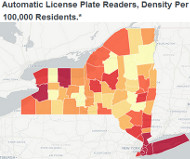5/26/2017
New York High Court Upholds License Plate ScanningNew York Court of Appeals takes up plate reading case for the first time to grant law enforcement unlimited ability to scan vehicles.

Throughout New York state, police agencies have for years been using automated license plate readers (ALPR, also known as ANPR in Europe) without the sanction of the legislature or the courts. Earlier this month, the New York Court of Appeals -- the state's highest court -- took up the question for the first time and sided with the use of plates to track members of the public, even if they are not suspected of committing any crime.
The town of Rhinebeck, for example, has a population of just 7548, but over the course of three months in 2011, it photographed 164,043 license plates. Of these, just eight were in any way linked to suspicious activity, according to documents obtained by the American Civil Liberties Union. Nonetheless, the movements of all motorists were stored in a long-term database. There are no statewide rules limiting how long such information can be stored.
Instead of taking on the broader question of the mass surveillance systems, the high court considered the case of a single Buffalo State University police officer manually entering a license plate number into the computer terminal in his patrol car. The judges selected this scenario to grant blanket approval to the broader effort of capturing and "checking" plate numbers with automated systems.
"We hold that such a check, even without any suspicion of wrongdoing, is permissible, and does not constitute a search," Chief Judge Janet DiFiore wrote for the court. "We further hold that information obtained indicating the registration of the vehicle is in violation of the law as a result of this check may provide probable cause for the officer to stop the driver of the vehicle."
New York's high court had ruled in 1975 that police could not conduct a "routine traffic check" of a motorist without a good reason. Since then, the judges reasoned, the privacy expectations have changed.
"A driver does not have any reasonable expectation of privacy in the license plate number itself, nor would any expectation in such publicly exposed information be recognized as reasonable by society," DiFiore wrote. "We now conclude that a driver has no expectation of privacy in the DMV database information associated with a license plate number."
Over the past fifteen years, federal courts have come to the same conclusion.
A copy of the ruling is available in a 50k PDF file at the source link below.


